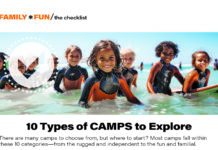By Terri Akman
Despite the winter weather, now is the time to think about your child’s summer camp experience. Whether choosing a day camp, residential camp or specialty program, experts urge you to do your homework to find the best fit.
All camps teach life lessons, encouraging kids to build relationships, try new things and gain independence. For some camps, those lessons happen within typical programs, such as swimming, arts and crafts, sports and music. Others specialize in a specific area, such as soccer, theater or robotics.
“When a child feels safe at camp and is engaged with the staff and connected to the other campers, he or she is willing to try new things and will take positive risks,” says Tom Rosenberg, American Camp Association president.
When to start camp
The average age to begin day camp is 7 or 8, and a bit older for residential camp, says Rosenberg. But you are the best judge of your child’s readiness to be away from home — and your willingness to let your child go.
As a child, Cristy Michaels had a wonderful experience at Appel Farms, an arts and music camp in Elmer, NJ. Michaels wanted a similar experience for her girls — Georgia, 10, and Marina, 8 — and she chose to ease them into a camp experience by first sending them to a nearby day camp when they were 6. By age 7, Georgia was ready for a residential experience.
“She’s the type of kid who is fiercely independent and never had a problem sleeping out,” says Michaels, a resident of Philadelphia’s Bella Vista neighborhood. Georgia went for one week when she was 7, then two weeks at 8, and four weeks once she turned 9.
But the timetable was different for her younger sister. “Marina told me she wasn’t ready yet but then a year later she said she was ready, but she just wanted to go for one week,” Michaels says.
Cass Winner, director of extended day and camp programs at Wilmington Montessori School in Delaware, reminds parents to consider each child’s individual needs. For example, “some children have heat sensitivity and if they have to be outdoors every minute of the day they’re going to be miserable,” she says. “You might want a place that has a balance of indoor and outdoor or has air conditioning if they’re feeling overheated.”
Questions to ask
Talk to friends and neighbors and explore camp websites as a good way to get started. Be sure the camp you choose is accredited by the ACA, insists Rosenberg. This ensures the camp has complied with 300 health and safety standards. Once you narrow down your choices, it’s time to speak with the camp director and make plans for a visit.
Here’s a checklist of questions to ask:
- What are the lengths of sessions?
- What is the camp’s culture and philosophy?
- What activities does it offer?
- What is the social environment?
- What are the rules around cell phone and computer use?
- Are campers allowed to go onto social media?
- Is the camp state or ACA accredited?
- What is the background of the director and staff?
- How is the staff trained?
- Is staff, including lifeguards, first aid and CPR trained?
- What is the minimum age of staff?
- What is the counselor/camper ratio?
- What are the medical facilities and who are the medical personnel?
- For what reasons are parents called?
- What is the parent visitation policy?
- What are the food options?
- Can they accommodate dietary restrictions or preferences?
- Is the camp very structured or do kids have downtime?
- What makes the camp unique and special?
- What are the costs?
- Most importantly, discuss your child’s personality and individual needs.
Parent visitation
About 90 percent of camps surveyed by the ACA restrict cell phone usage, so if a parent wants to speak with his or her child at camp, the parent needs to call the camp directly. That’s not something parents or kids are used to in the cell phone generation, but it’s wonderful for the kids, says Rosenberg.
“It’s an opportunity to look people in the eye and have a very social summer,” he says. “Kids need to develop core social-emotional skills.”
Theresa Booth, senior director of child development at Camp Merrywood in Pittsgrove, NJ, encourages parents to make an unscheduled visit to the camp while their child is there. “When the camp has an open-door policy, you know there isn’t anything they are trying to hide,” she says.
Check in with the camp director, letting him or her know you want to see your child for a few minutes. “Parents need to ask their child questions: Is everyone treating you all right there? Has anyone said anything inappropriate to you? Is there anything I need to know?”
Terri Akman is a MetroKids contributing writer.






